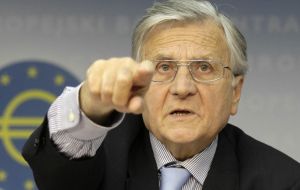MercoPress. South Atlantic News Agency
Euro-zone leaves rates unchanged: “uncertainty remains high”
 Trichet says worst of recession is behind
Trichet says worst of recession is behind The European Central Bank left the main rate at 1% and President Jean Claude Trichet said at a press conference in Venice on Thursday that the ECB has no plans to raise borrowing costs, describing their level as “appropriate”.
He added that the Euro-zone economy has seen the worst of the recession and is “out of freefall”. Trichet used the word “stabilising” but warned that the EU was “expected to recover at a gradual pace” and that “uncertainty remains high”.
“We have to be cautious. We have to be prudent”, he underlined.
Earlier this week, revised figures showed Euro-zone economic activity shrank by 0.2% between April and June - worse than originally thought. But the area is expected to emerge from recession in the third quarter.
Some countries including France and Germany have already returned to growth. Revised figures show Greece, Poland, Portugal and the Czech Republic have now also emerged from recession.
Earlier this week, Australia, which has so far avoided recession, became the first major economy to raise rates since the onset of the financial crisis.
The International Monetary Fund forecasts GDP will expand by just 0.3% in the 16-nation Euro-zone next year.
This week, the European Commission said that another nine EU nations were now breaking a key rule requiring them to keep budget deficits beneath 3% of GDP.
Germany, Italy, the Netherlands, Austria, Belgium, Slovenia, Slovakia and Portugal had breached rules on budget deficits, as had the Czech Republic, which lies outside the Euro-zone.
The rules to keep debt and deficit within certain limits are designed to keep the finances of the 16 nations which use the euro in line, promoting the stability of the currency.
Trichet declined to signal heightened concern about the US dollar’s 17% slide against the Euro since February, reiterating his stance that the US administration’s stated preference for a “strong dollar” is “important.”




Top Comments
Disclaimer & comment rulesCommenting for this story is now closed.
If you have a Facebook account, become a fan and comment on our Facebook Page!